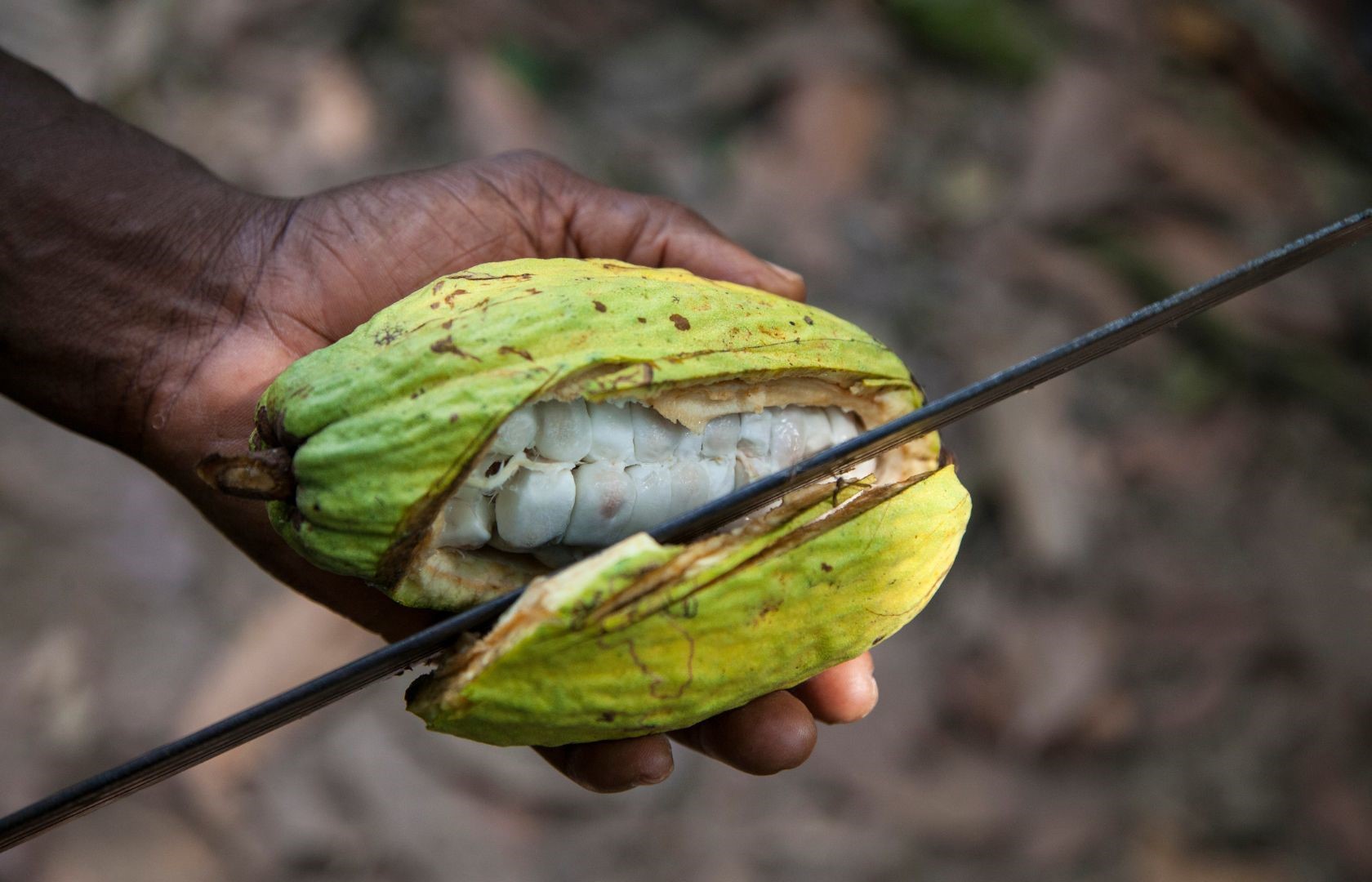Cocoa Sustainability and Farmers’ Empowerment
The challenges W. African cacao farmers face can be overcome or at least softened by the measures presented below in this article.
Empowering Farmers through Direct Sourcing and Fair Trade
Cocoa, the delicious ingredient that fuels our love for chocolate, often comes at a hidden cost for the farmers who cultivate it. In West Africa, particularly countries like Cote d’Ivoire and Ghana, the backbone of cocoa production lies with small-scale farmers tending plots of land, typically around 2-3 hectares, scattered across various locations. Despite their hard work caring for aging cocoa trees, low yields result in meager rewards. The lack of direct contact with sourcing companies further complicates this situation. Middlemen dominate the supply chain, exploiting the farmers’ limited bargaining power (2).
The gravity of the situation becomes clear when we look at the statistics. A staggering 87% of cocoa farming households in Cote d’Ivoire live below a living income, struggling to afford basic necessities for themselves and their families (3). In Ghana, the price paid to farmers for their cocoa beans is $1.56 per kg for 2023/2024, highlighting the economic hardship they face. In Nigeria, cocoa’s predicted import price is likely around $3.35 per kg (4,5).
Efforts and initiatives to support cacao farmers – success stories
Fortunately, there are initiatives offering a path towards a more sustainable future. Programs like Rainforest Alliance’s pilot scheme directly connect farmers with companies that purchase their beans, empower them, and ensure fairer compensation by cutting out exploitative middlemen (6). Beyond Beans-ETG’s project in Nigeria exemplifies another successful approach. As part of further building farmers’ capacity in good agricultural practices and providing tailored training to improve their productivity, in 2023, beyond beans-ETG rehabilitated old cocoa farms in Nigeria and distributed more than 40,000 cocoa seedlings to more than 3,000 cocoa farmers in 20 communities in Ikom, Cross River State. This initiative provides training and resources to farmers, boosting their productivity and overall well-being (7). Additionally, Nestle’s collaborative effort with global suppliers focuses on reducing the cocoa supply chain’s carbon footprint while improving farmer resilience in the face of climate change (8).
The positive impact of sustainability programs is undeniable. Fairtrade programs on the Ivory Coast have demonstrably increased farmers’ income by 85%, a significant step towards not only improving their lives but also ensuring the long-term viability of the cocoa industry (9).
While these programs offer a ray of hope, the reality is that many cocoa farmers, particularly those with small plantations, still lack access to government support and struggle to make ends meet (10). This hardship can even limit educational opportunities for their children (11). However, some sustainability programs recognize this challenge and actively encourage and support formal education for participating farmers (1).
Pathways to a Sustainable Future for Nigerian Cocoa
Government initiatives
In pursuit of elevating the livelihoods of cocoa farmers in Nigeria and surpassing the productivity levels of Cote d’Ivoire and Ghana by 2026, the Cocoa Management Committee (appointed by the Federal Government of Nigeria) has recommended the establishment of a National Cocoa Board. This board aims to oversee ethical sourcing, promote sustainable production practices, and safeguard the environment.
Also, to mitigate climate change, the government must ensure cocoa production is void of deforestation. To this end, Nigeria will adhere to European Union Regulation Compliance, effective by December 30, 2024, ensuring that cocoa beans procured from the country originate from non-deforested areas (12).
Furthermore, stringent enforcement of human rights and environmental due diligence regulations within the cocoa sector is imperative to combat child and forced labor and mitigate climate change-induced deforestation.
Fair Pricing Models and the African Cocoa Exchange
The proposed African Cocoa Exchange, supported by the International Cocoa Organization (ICCO), will address farmers’ income disparities, facilitate fair pricing, and empower African cocoa producers, ultimately striving for a living income for cocoa farmers (13).
Income diversification and ethical sourcing for cacao industry resilience
Climate-smart Practices
Given the current landscape, there is an urgent need for a more sustainable and equitable cocoa industry. Implementing climate-smart farming practices, promoting crop diversification, and prioritizing long-term soil health are essential strategies for cocoa farmers to withstand the challenges posed by a changing climate. Moreover, adopting fair pricing models and ethical sourcing practices is pivotal to ensure that cocoa-producing nations and farmers receive equitable returns for their efforts.
Although significant challenges exist, the success of sustainability programs underscores a promising trajectory. A concerted effort from consumers, companies, and governments is indispensable to realize a prosperous future for cocoa farmers and foster a sustainable cocoa industry (14).
Consumers can contribute by supporting companies committed to fair trade and sustainable sourcing practices, while governments can play a pivotal role by investing in initiatives that empower cocoa farmers and diversify their income streams. Ultimately, collaborative action is imperative to usher in a brighter future for cocoa farmers and cultivate a sustainable cocoa industry (15).
By implementing these proposed policies and development initiatives, Nigeria can create a more sustainable and equitable cocoa industry. This will not only improve the lives of cocoa farmers but also ensure the long-term viability of the sector and its contribution to the Nigerian economy.
References
- www.weforum.org
- Douglas Yu, 2018
- Adebayo, 2023
- Michael Odigie, 2024
- www.selinawamucii.com
- www.rainforest-alliance.org
- Beyond beans foundation
- nestle.com
- www.fairtrade.net
- www.vanguardngr.com/2024
- Douglas Yu, 2018
- Bermudez et al., 2022
- www.icco.org
- Banker, 2021
- GGI Insights, 2024
Further reading
Cocoa Farmers’ Livelihood Challenges in West African
Cacao Certification as a driving force for adopting Improved Farming Technologies in Ghana, Africa
Cacao Soil requirements and Planting distances
Cacao Fertilization and Nutrient Requirements
Cacao Variety Selection and Propagation – What are the 3 major variety of cacao?
Yield, Harvest, Handling and Storage of Cacao
Cacao production: Challenges and Management Strategies
Sales, Trading, and Shipping Cocoa Beans
Why Ghanaian Cocoa Farmers turn towards Sustainable Agriculture Practices










































































